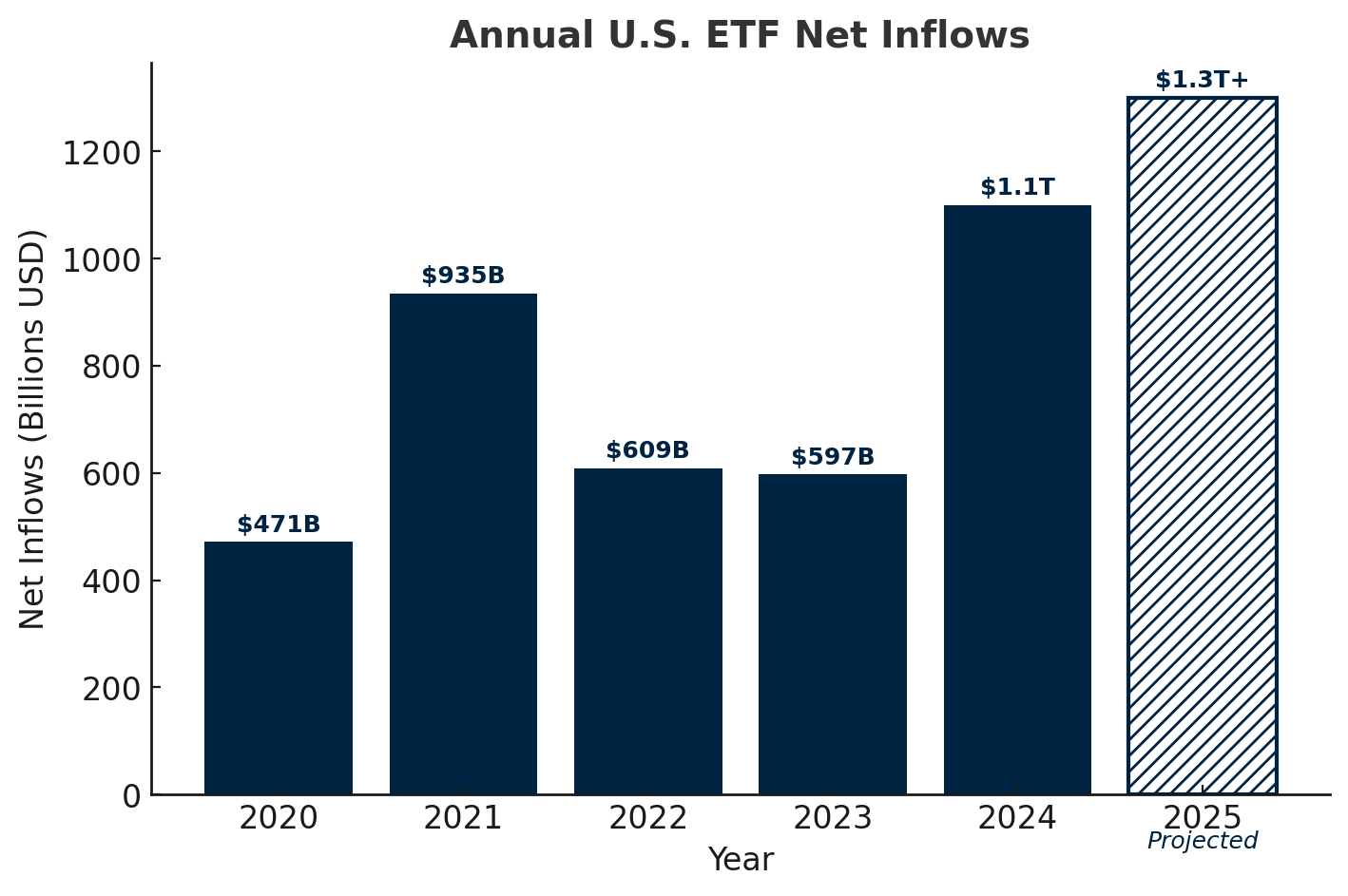
.avif)
The shift from mutual funds to ETFs is reshaping asset management. Firms that move quickly by aligning operations, technology, and product strategy with the ETF marketplace stand to capture an outsized share of future inflows. Ridgeline’s platform is built to make that move possible and profitable, giving managers the speed, efficiency, and flexibility to lead in the ETF era.
In 2024, U.S.-listed exchange-traded funds (ETFs) attracted $1.1 trillion in new inflows while long-term open-end mutual funds lost $576 billion. This marked a stark reversal from the decades-long dominance of mutual funds.
The end of Vanguard’s share class patent that same year further accelerated the launch of new ETFs and conversions from mutual funds, lowering barriers for managers who previously relied on mutual fund share classes. That shift gave firms more flexibility in how they package and distribute strategies, fueling a wave of innovation in the ETF market.
That momentum has only strengthened in 2025. As of this July, ETFs have already pulled in nearly $677 billion in net inflows and are on pace to surpass $1.3 trillion by year-end, setting a new record. Total ETF assets now exceed $11.5 trillion, with growth coming from both traditional passive index trackers and a fast growing segment of actively managed ETFs.
By contrast, long‑term mutual funds continue to experience persistent redemptions. In the week ending July 23, 2025, active mutual funds saw $10 billion in outflows, extending a multi‑year trend of capital reallocation away from traditional fund structures.
Investors and advisors are increasingly prioritizing customization, tax efficiency, transparency, and lower fees. It’s not a coincidence that these are all areas where ETFs have a clear advantage. The ETF wrapper has become the centerpiece of many asset managers’ product strategies, especially for firms seeking scale, stronger distribution, and alignment with evolving investor expectations.

ETFs combine efficiency, flexibility, and market reach in ways that traditional mutual funds struggle to match. One of the most important advantages is after‑tax efficiency. Through the in‑kind creation and redemption process, managers can remove low-cost-basis securities from a portfolio without triggering taxable gains for the remaining investors, improving after-tax performance.
ETFs also provide intraday liquidity, enabling managers to fine‑tune exposures, execute tactical shifts, or implement hedges throughout the trading day without disrupting the overall strategy. This flexibility is particularly valuable for managing risk in volatile or fast‑moving markets.
Transparency is another differentiator. Most ETFs disclose their holdings daily, compared to the quarterly disclosures typical for mutual funds. This frequency allows for more precise monitoring of risk and factor exposures, improving both compliance oversight and portfolio optimization.
On the distribution side, ETFs have become embedded in model portfolios, separately managed accounts (SMAs), and outsourced CIO (OCIO) programs. This integration significantly broadens their reach, often making ETFs the default investment vehicle in many advisory channels.
Finally, product innovation has expanded the ETF’s appeal beyond passive index tracking. The growth of active ETFs gives managers discretion to pursue alpha‑generating strategies, while semi‑transparent ETFs allow them to protect proprietary holdings and trading tactics. Together, these developments let managers offer differentiated investment approaches without sacrificing the structural benefits of the ETF wrapper.
A critical part of ETF efficiency lies in basket management, which is the process of exchanging securities with Authorized Participants during ETF share creations and redemptions. This is where many legacy investment platforms fall short. Without native basket functionality, managers are forced into manual, offline processes that slow time‑to‑market and increase operational risk.
Ridgeline automates the extraction of the standard basket and prepares the file for downstream transmission. Teams can then deliver the basket to their transfer agent or Authorized Participant using existing channels.
The bigger advantage is how Ridgeline handles primary-market flows inside the books and records. Creation and redemption activity is recorded as accounting entries the moment it occurs, so positions and cash reflect those flows immediately. Many legacy systems need to reimport files or apply temporary workarounds to approximate intraday transactions, which introduces reconciliation risk. Ridgeline also reconciles intraday trading against end-of-day requirements and issues trader alerts when actions could create operational mismatches or settlement issues.
Custom Basket Support
SEC Rule 6c-11, adopted in 2019, expanded the ability for ETFs to use custom baskets, making basketing flexibility a central tool for optimizing tax outcomes and managing liquidity. Yet most legacy OMS and PMS platforms still lack the ability to automate basket creation, lock in components, aggregate multi-day trades, or communicate basket details efficiently to market makers and custodians.
“It’s a very manual process for ETF managers, this custom basket process, requiring spreadsheets, talking to a lot of different people,” said Madison Early, Director of Operations at Motley Fool Wealth Management in a recent Meet Ridgeline webinar. “We mentioned it during implementation, and Ridgeline came back with a prototype they’d already created. We couldn't believe it. They can handle those complexities and make the workflows easier and more efficient for us.”
Currently in design, this prototype will allow Ridgeline to natively support all ETF basket workflows, including custom baskets, giving managers the tools to run tax-aware operations, manage liquidity, and align basket activity with portfolio rebalancing. All of this will happen within a single platform that automates creation and redemption workflows, tracks compliance, and synchronizes portfolio accounting.
Ridgeline’s cloud‑native investment management platform is designed to handle the full spectrum of modern investment vehicles, from traditional mutual funds to the most advanced active ETF strategies.
With a unified architecture and a single source of truth for all portfolio, trading, compliance, accounting, CRM, and client‑reporting data, Ridgeline eliminates the silos and bolt‑on modules common in legacy systems. This means faster launches, lower operational risk, and greater agility when entering or expanding ETF product lines.
Ridgeline was built to automate customization, allowing firms to deliver personalized service and support diverse vehicles (ETFs, SMAs, mutual funds, model portfolios) without adding headcount or relying on manual workarounds. AI‑driven workflow agents further reduce operational burdens and improve client responsiveness, transforming the asset management operating model.
The platform enables asset managers to launch ETF products faster with built‑in operational workflows, compliance controls, and portfolio accounting tailored for primary market activity. Managers can scale across multiple vehicle types without duplicating systems or creating data silos, integrate seamlessly with distribution channels that expect ETF availability, and maintain real‑time portfolio, compliance, and risk visibility across all products.
This integrated approach removes the technology friction that can delay ETF initiatives and allows managers to focus on strategy, execution, and distribution.
The industry is moving away from traditional, segmented investment vehicles as asset managers have had to adapt to the evolving needs of their clients. Both organic and inorganic growth has come from diversification and personalization to the end investor by offering additional methods for distribution and a white glove service.
The migration from mutual funds to ETFs represents one of the most significant structural shifts in asset management in decades. Firms that adapt quickly and align their operations, technology, and product strategy with the demands of the ETF marketplace will be positioned to capture a disproportionate share of future inflows.
Ridgeline offers the operational capabilities to make that transition not only possible, but profitable. In an environment where speed, efficiency, and flexibility are competitive weapons, Ridgeline is uniquely positioned to help asset managers lead in the ETF era.
Want to dive a little deeper into Ridgeline functionality? Request a demo or send us an email at hello@ridgelineapps.com.


